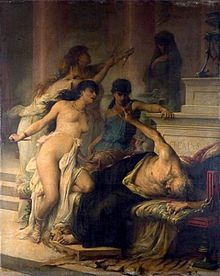Pelias was the king of Iolcus in Greek mythology, son of the god Poseidon and Tyro. He was married either to Anaxibia or Phylomache; with his wife, they had a number of children, including Acastus, Pisidice, Alcestis, Pelopia, Hippothoe and Antinoe.
Poseidon fell in love with Tyro, who was interested in the river god Enipeus. So, Poseidon disguised himself as Enipeus and slept with Tyro; she was impregnated and gave birth to Pelias and Neleus, who were left by Tyro to die on a mountain. However, a herdsman found the infants and raised them. When Pelias and Neleus reached adulthood, they searched for their mother, and then killed her stepmother who had been mistreating her for years.
Pelias wanted to rule over Thessaly; so he banished his brother Neleus and his half-brother Pheres, while he imprisoned his other half-brother Aeson. While imprisoned, Aeson got married and had a number of children, including the famous Jason, whom he managed to disguise and send away, in fear that Pelias might kill him as a rightful heir of the throne.
Pelias was consumed with fear that someone might overthrow him, especially after he received a prophecy from an oracle to beware of a man wearing one sandal. Years later, he organised the Olympics in Iolcus. Jason decided to participate, and he set forth to Iolcus, but lost one of his sandals on his way there. He eventually reached Iolcus, where he was announced as the man with one sandal. Peleus, overcome with fear, tried to devise a plan against him. He asked Jason what he would do if he met the man who would destroy him; Jason replied that he would tell the man to fetch the Golden Fleece. So, Peleus gave Jason the task of finding the Golden Fleece, which could be found in Colchis, in a garden belonging to King Aeetes and guarded by a never-sleeping dragon.
Jason gathered a party of heroes, collectively called the Argonauts, and they all set sail on Jason's ship, the Argo. They successfully managed to retrieve the Golden Fleece and bring it back to Pelias. When they returned, Pelias refused to give his throne to Jason, so Medea, the daughter of King Aeetes who fell in love with Jason and followed him, made a plan to have Pelias killed by his daughters. She said she could give the youth back to anyone by cutting them up and boiling them. The daughters believed her after seeing a demonstration with an old ram; excited, they cut their father to pieces and threw him in a pot. Of course, Pelias did not come back to life. An alternative version of the story has it that Medea cut the father of Jason into pieces, and indeed brought him back to life at a much younger age. She then promised she would do the same for Pelias, but after his daughters killed him, she simply ignored them. Because of this, Medea and Jason were banished from Iolcus, as murderers.

Comments
Post a Comment